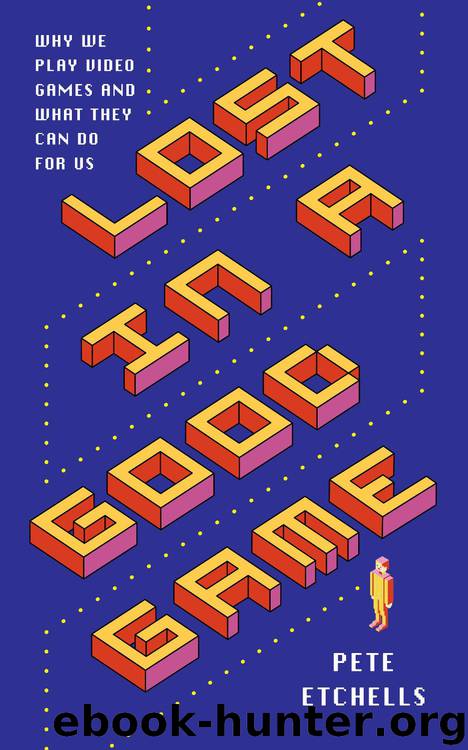Lost in a Good Game: Why We Play Video Games and What They Can Do for Us by Pete Etchells

Author:Pete Etchells [Etchells, Pete]
Language: eng
Format: epub
ISBN: 9781785785061
Amazon: B07L484RFN
Publisher: Icon Books Ltd
Published: 2019-04-03T23:00:00+00:00
In the above example, after sixteen attempts, you have won four times – on the second, sixth, twelfth and fourteenth rounds – but you have lost twelve times, which averages out to a one in four chance of winning. It might seem like this wouldn’t have any reinforcing effect on your behaviour, but two things are against you. The first is that you can never precisely predict when you’re going to hit the jackpot, which means that you’re more likely to carry on playing until you do win. The second is that you win with just enough frequency not to be put off by the number of times you lose. Both of these factors serve to create a situation in which – despite the odds not being in your favour – it’s very difficult for you to stop playing. Many freemium games now employ this exact same method. Take a standard ‘match-three’ game, like Candy Crush Saga. On each level, the puzzle board is random – if you play the same level twice, it’s likely that you will get a different configuration. That means you cannot devise or memorise a strategy to beat a particular level: whether you win or lose depends on a variable-ratio schedule, because some levels will be easier to beat than others. It might feel as though you have some level of control over your chances of success, and can affect the outcome via your skill at the game, but this is largely an illusion, carefully crafted to encourage you to keep playing.
There are other mechanisms that freemium games employ to keep us playing, and some of them are just as counterintuitive. For example, while it might seem that limiting the amount of time you’re able to play a game might be a good thing, it can actually increase your desire to play it. Many freemium games frequently use time limits on the number of attempts at a level that you can have – so for example, you might be given five chances, or ‘lives’, to complete a level, and after the fifth failed attempt you’re made to wait for your lives to replenish, which they might do at a rate of, say, one life every half hour. This sort of mechanism provides another opportunity to extract money from players – very often, such games offer you the option to spend a small amount of money in order to unlock your lives immediately. But this sort of gating mechanism has an additional effect – it leaves you wanting more. As games researcher and author Jamie Madigan has written, the effect relates to something known in psychology as ‘hedonic adaptation’. This is the idea that over time, if you have unrestricted access to something you really like, the amount of pleasure (the technical term for which is ‘hedonia’) in it gradually diminishes. Withhold access to that thing though, and the rewarding effect that you get from it stays stable. For example, Madigan has previously highlighted a 2013
Download
This site does not store any files on its server. We only index and link to content provided by other sites. Please contact the content providers to delete copyright contents if any and email us, we'll remove relevant links or contents immediately.
Blood, Sweat, and Pixels by Jason Schreier(3614)
Godot 4 Game Development Cookbook by Jeff Johnson(2911)
Dawn of the New Everything by Jaron Lanier(2770)
The Art of Doom by Bethesda(2153)
Significant Zero by Walt Williams(1957)
Creative Character Design by Bryan Tillman(1922)
Human-Computer Interaction in Game Development with Python: Design and Develop a Game Interface Using HCI Technologies and Techniques by Joseph Thachil George Meghna Joseph George(1905)
Art Of Atari by Tim Lapetino(1788)
World of Warcraft Chronicle Volume 3 by Blizzard Entertainment(1743)
Mission Python by Sean McManus(1686)
The Ultimate Roblox Book by David Jagneaux(1685)
Pillars of Eternity Guidebook by Obsidian Entertainment(1668)
Dawn of the New Everything: Encounters with Reality and Virtual Reality by Jaron Lanier(1618)
Unreal Engine Virtual Reality Quick Start Guide by Jessica Plowman(1562)
1628927445Game by Unknown(1553)
Unreal Engine 4 Virtual Reality Projects by Kevin Mack(1553)
The Ultimate Player's Guide to Minecraft by Stephen O'Brien(1533)
Learning D by 2015(1515)
Unity 2018 By Example by Alan Thorn(1461)
